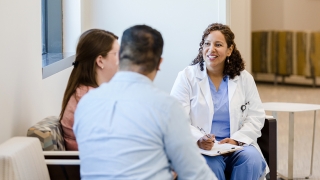Beyond Illness and Injury: Social Needs Support in the Emergency Department
Published on
Published on
 When families bring their child to the emergency room at the Children’s Hospital of Philadelphia (CHOP) Philadelphia Campus, they expect to receive the medical care their child needs. They probably don’t expect to receive nonmedical support that can help their whole family. Now, thanks to Family Connects, they can.
When families bring their child to the emergency room at the Children’s Hospital of Philadelphia (CHOP) Philadelphia Campus, they expect to receive the medical care their child needs. They probably don’t expect to receive nonmedical support that can help their whole family. Now, thanks to Family Connects, they can.
Family Connects is a service where families are asked if they have additional needs in areas such as:
The Family Connects representative then shares information about available programs with the parent or caregiver — in the community and at CHOP — that can meet their needs.
| Type | % requesting* |
|---|---|
| Housing | 24% |
| Food | 22% |
| Baby items | 20% |
| Utilities | 16% |
| Mental health | 10% |
| Childcare | 5% *Of families requesting assistance, these areas were most frequently mentioned. Some families asked for help in more than one area. |
Family Connects was born during the early weeks of the COVID-19 pandemic. Many families that came to the ER were facing dire situations. Jobs had been suspended, so families had no income. People had reservations about shopping, so their food supplies were low. Their kids were home but had no access to online school.
A group of Emergency Department clinicians, led by Lauren VonHoltz, MD, MPH, was moved to create Family Connects to meet the needs of families. At that time, many of CHOP’s locations were closed or operating with limited hours, leaving nurses and social workers with available hours to help. They became Family Connects’ first contact representatives.
In those early days, staff interacted with families only by phone and texts to limit risk of spreading the virus. When CHOP locations returned to normal operating hours and staff were pulled back to their former jobs, Family Connects turned to medical, nursing, public health and social work students at the University of Pennsylvania to take on the contact representative role.
Family Connects helped so many families in its first year that the founding team believed it should continue, even as the worst of the pandemic passed. The team applied for and was chosen to receive a Chair’s Initiative grant, an internal, competitive grant program that offers seed money for promising programs. The grant provided funding for 2021 and 2022, allowing Family Connects to hire a social worker to follow-up with families to see if they had been able to get the help they needed from the resources CHOP had told them about during their ER visit.
During the two years of Chair’s Initiative funding, Family Connects representatives contacted 15,000 families and provided CHOP and community resource information to 2,300 families. The most requested resources involved food, housing, mental health care, utilities and common items like diapers and baby formula. Approximately 30% of participating families request resources in two or more areas.
Family Connects is clearly serving an important role of living up to its name: connecting families to the nonmedical help they need.
Unfortunately, the full-time social worker position is no longer funded. Experienced student volunteers have moved into that role, but — given their school schedules — aren’t able to always connect. Philanthropic support could restore that important position and allow for consistent follow-up with families. Additional funding would also support expansion that would provide for greater outreach, strengthen community relationships and foster the development of more formalized student education.
Family Connects also provides important educational and training to the student volunteers — a wide-reaching benefit that could heighten the level of awareness of social needs and empathy for struggling families for decades as the students become clinicians, counselors and researchers.
VonHoltz shares weekly tips and holds monthly meetings with the student volunteers, where CHOP staff talk about support programs families may benefit from, such as the Stop IPV (intimate partner violence) Program and Center for Violence Prevention.
“We are providing very hands-on and tangible education about social determinants of health, of how you address these issues and about how you can have these conversations with families,” VonHoltz says. “Most students will go to an advocacy lecture or two throughout their training and gain some baseline knowledge about it. But until they really experience the breadth of people and the extent to which our families in the greater Philly area are struggling with social needs, they can’t truly understand how important it is.”
Sometimes, a parent might not express a specific need but uses the opportunity to talk with the contact representative about the stresses in their lives, concerns about their child or how they are feeling overwhelmed. By simply listening, the representative provides emotional support the parent might not find elsewhere. On occasion, parents have opened up about their own mental health needs or being the victim of intimate partner violence. The contact representative has gotten them the help they need.
“We can influence a whole generation of providers to see beyond a patient’s initial illness or injury to learn about social needs the family may have that are hindering their ability to provide the healthiest environment for their child,” VonHoltz says. “They learn how to have these conversations openly and without judgment, to listen with compassion.”
VonHoltz and her team envision growing the program to include students attending other local colleges as volunteers, adding a staffer devoted to follow-up and growing the list of available resources, and replicating the model in other Emergency Departments across the city — and even the country.
If you are interested in learning how you can support Family Connects, please reach out to Melissa DeFreece, Senior Associate of Annual Giving, at defreecem@chop.edu.